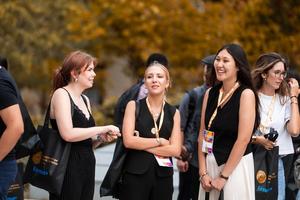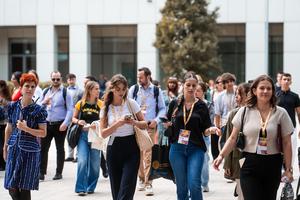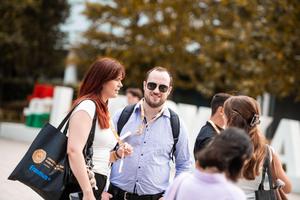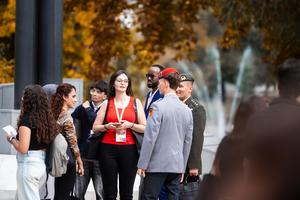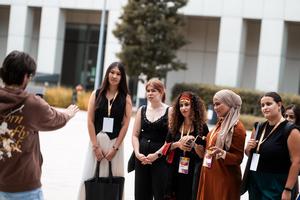Our university held its International Welcome Day on September 10, where international students—including those participating in the Erasmus, ICM, and Stipendium Hungaricum programs—were welcomed.
In her opening speech, Judit Galambos, Head of the International Relations Department of the IO, welcomed the participants and presented the program of the day, which included an overview of the faculties and the various student organizations within the institution. She spoke about the tasks of the International Office and introduced the colleagues who support foreign students. She emphasized LUPS’s (Ludovika University of Public Service) commitment to supporting international students and building an international community. She also highlighted that this year the university admitted a record number of nearly 150 international students, 85% of whom are enrolled at the Faculty of Public Governance and International Studies.
In the first part of the event, representatives of LUPS faculties presented their programs and international activities. Following the faculty presentations, student organizations were introduced and the event was closed with the remarks of the Vice-Rector for International Affairs of LUPS. The event was moderated by Eszter Price, staff member of the International Office (IO).
Pier Paolo Pigozzi, Vice-Rector for International Affairs of LUPS, welcomed the international students, highlighting their role in strengthening the university’s global ties and expressing appreciation for their contribution to enriching the university’s cross-cultural community. He emphasized that LUPS is unique in cultivating the values of public service in the Hungarian millenary tradition on striving for understanding and achieving the common good and the protection of the human dignity of its citizens. The Vice-Rector underlined that the university’s mission is to support students as they prepare for careers in public service, especially to build up their good conscience to act for the common good of society they will serve. He pointed out that no legal or international framework alone can prevent abuses of power, which is why individual and community engagement is key. He urged students to examine difficult questions and put to the test the traditional system of values as a relevant answer to present challenges. After his speech, he presented letters of appreciation to the university’s most active international students in recognition of their valuable contribution as an international student, participating in the Stipendium Hungaricum Intercultural Workshop events organized by the Ludovika Welcome Center Department of the International Office during the 2024/2025 academic year.
In the presentation of programs and international activities of each Faculty, Péter Krisztián Zachar, Vice-Dean for International Affairs of the Faculty of Public Governance and International Studies (FPGIS), detailed the faculty’s courses and underlined that FPGIS has an internationally outstanding and innovative team. He stressed the importance of nurturing international relations. Among other things, new programs in cybersecurity have been launched, along with a business student career initiative that builds bridges between students and Hungarian industries. Research groups are also open to students who wish to join, further emphasizing the international and community-oriented nature of FPGIS. Ambassadors and representatives of international organizations are regularly invited to give lectures to students, while visiting professors are offered research opportunities and masterclasses, for example in geopolitics. The faculty’s goal is to create an active and supportive community where students receive every assistance.
Lieutenant Colonel Ferenc Petruska, Vice-Dean for International Affairs of the Faculty of Military Science and Officer Training (FMSOT), presented a video on officer cadet training, stressing that students are prepared for defending the homeland with courage, stamina, challenges, readiness, dedication, and team spirit. FMSOT encourages cadets to actively engage in scientific life and join research projects.
Zágon Csaba, Head of the Scientific and International Department of the Faculty of Law Enforcement (FLE), noted that FLE is not only the university’s second largest faculty but also a genuine community training professionals for Hungarian and international law enforcement bodies. He highlighted the courses specializing in combating organized crime, as well as the EU agency CEPOL, which enables students to pursue European studies and earn internationally recognized degrees. With nearly 2,500 students, the faculty offers a modern learning environment. Doctoral programs provide opportunities for those interested in law enforcement sciences to conduct in-depth research. He emphasized that FLE focuses not only on professional excellence but also on community building.
Tamás Pálvölgyi, Vice-Dean for Strategic and International Affairs of the Faculty of Water Sciences (FWS), stressed in his lecture that one of the faculty’s main objectives is to approach water issues with complexity and sustainability in mind. He pointed out the importance of technical aspects, innovation policy, and governance strategies. He added that FWS is also known for its significant R&D activities, which students can join. Two years ago, the Student Scientific Club was launched, providing a platform for professional exchange and informal discussions between students and lecturers, thus offering opportunities for learning beyond the classroom.
Gábor Kovács, Vice-Dean for Research of the István Nemeskürty Faculty of Teacher Training (IINFTT), noted that the faculty was established just over a year ago, with its first cohort having recently begun their studies. He spoke about the versatility of the faculty’s namesake and explained that the programs focus on education, pedagogy, the humanities, as well as communication and media. He then provided a detailed overview of the training opportunities available at INFTT.
Following the faculty presentations, student organizations were introduced. Bálint Koós, International Vice President of the Student Union, presented how the organization supports students’ community and international activities. Míra Batki, President of the Erasmus Student Network (ESN), introduced the programs and community events organized for Erasmus students. Johanna Seres, mentor of the Stipendium Hungaricum program, presented the scholarship opportunities and support system it provides.
The day concluded with an interactive campus tour organized by the Student Union, where students were introduced to the most important locations of the LUPS campus, including educational buildings, the library, and community spaces.
Text: Zsófia Sallai
Photo: Dénes Szilágyi
.jpg)
.jpg)
.jpg)
.jpg)
.jpg)
.jpg)
.jpg)
.jpg)
.jpg)
.jpg)
.jpg)
.jpg)
.jpg)
.jpg)
.jpg)
